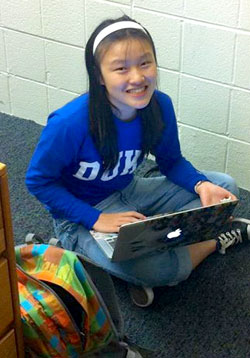
Goldman Sachs Summer Research Fellow Cathy Li is using what she learned in the classroom to use optical systems to enhance machine learning.
Li, a junior majoring in physics, works with Dan Gauthier, Robert C. Richardson professor of physics and professor of electrical and computer engineering.
Machine learning means that no human is involved for a computer to complete a task, Gauthier said. Examples of machine learning include Facebook suggesting the name of a friend when one posts an image or Siri recognizing spoken words. Gauthier and Li are looking at reservoir computing, a specific type of machine learning.
“A reservoir computer is a class of artificial neural network that can be used for processing information that we believe is similar to the way in which the brain processes information,” Gauthier said.
Most research on machine learning focuses on data that varies only in time, Gauthier said. Li’s project, however, explores how to create a computer that works with video imagery, which has varied spatial and temporal aspects.
“In our long term vision, we will construct a ‘network’ that consists of ‘nodes’ connected by ‘links,’ where the nodes are … similar to a neuron in the brain and the links are electrical pathways that route signals from one node to another,” Gauthier said.
Li, who is from Changsha, China, said computers that learn through programming are not as efficient as those that learn through optical systems.
“We believe that this approach may result in easier, quicker and more accurate training of the neural network as well as the actual computational speed of the network for completing complex tasks,” Gauthier said.
Li’s daily work involves pulling from what she has learned in her math, physics, computer science and engineering courses by doing computer programming. She added that she hopes to turn her research into a senior thesis project.
“It’s a little different from taking a class where you have a syllabus and you know what you’re going to learn,” Li said. “During my summer research, I learn because I want to solve a problem and when you solve it, it leads to another problem. The knowledge that you’re gaining is getting more and more complex.”
She also said she enjoys the creativity needed to solve problems in the lab.
Beyond her academic interests, Li is involved with Duke University Union as a member of the events committee. She has helped organize several events on campus, including drawing a map for Quest—an annual scavenger hunt. Li is also a member of the badminton club, mentored freshmen as a First-Year Advisory Counselor and worked as a teaching assistant for an introductory physics class.
Li added that she has tented for the past two years for the annual Duke versus University of North Carolina game, and enjoys jogging along Campus Drive.
Currently, Li is considering going to graduate school to study astrophysics. Even though her current project does not relate to astrophysics, she said the experience will be valuable in teaching her the basics of independent research.